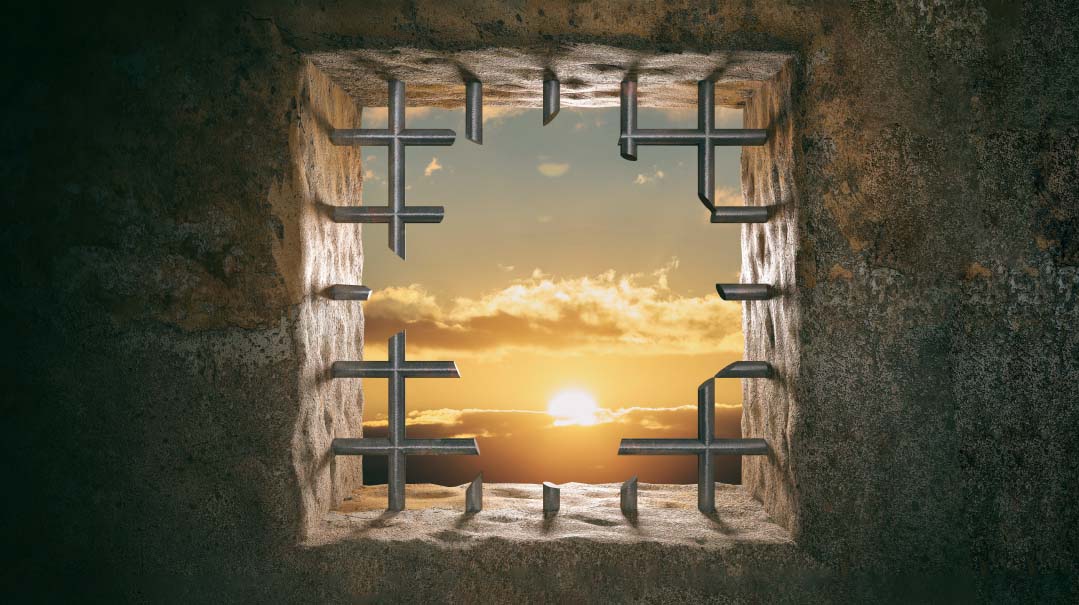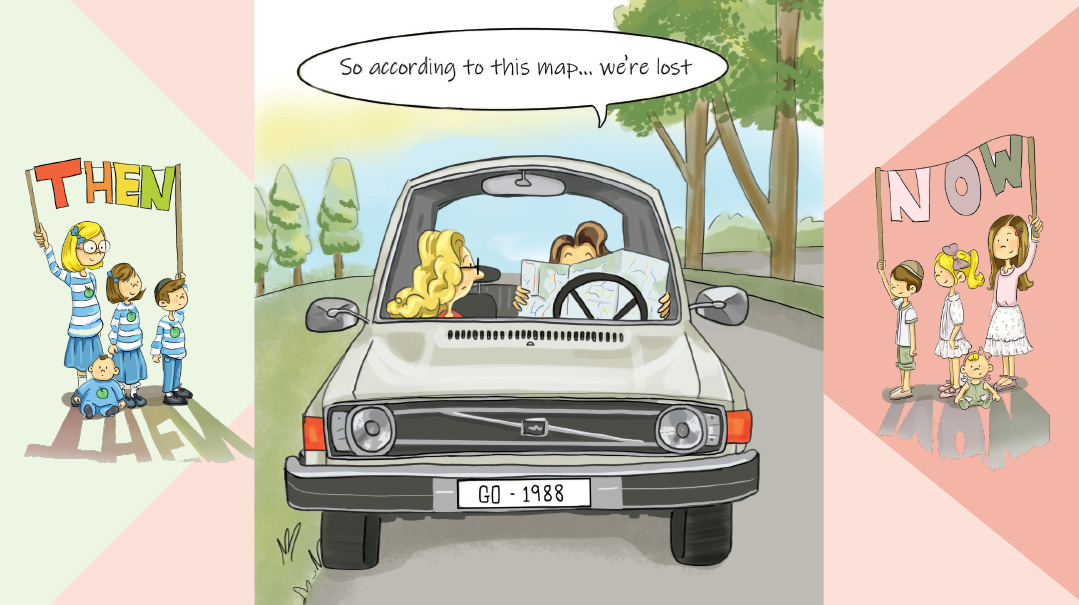Free Spirit

"We’re going to stay strong and connected to Hashem. This is a nisayon, but we will do this”

"There were multiple times our world was shattered,” says Roza Hindy Weiss, as she looks back at the landscape of their ordeal. “It was always, Okay, this has to be the worst it gets, but then, many times, it just got worse. My father’s arrest was one of the darkest times.”
The saga began 12 years prior to Rabbi Rubashkin’s arrest following a massive immigration department raid on the family’s meat processing plant, Agriprocessors. When Roza Hindy, the oldest of the ten Rubashkin children, was just bas mitzvah, her family moved to the Midwest to join the family business.
“That first year,” Roza Hindy recalls, “our community wasn’t just small, but tiny. My brothers and I were the only students in our new school, and were joined by a handful of friends a few months in. Five years later, I graduated 12th grade with four other classmates.
“Yet I had an incredibly healthy and wholesome childhood. Every Yom Tov was an opportunity to celebrate life and spread sparks of Yiddishkeit within our modern-day shtetl. On Purim, everyone got a package, and Simchas Torah was filled with pure excitement and joy.
“Financially, my parents were people of means, but gashmiyus wasn’t the agenda, only serving Hashem and His Torah. Our parents taught us that Hashem has empowered us to make this world His home, that each of us had a specific mission in this world that no one else could do.
“When my father was in jail, I kept having this vision of the shtetl, of a brand-new community, I’d recreate alongside my father when he came out. ‘Roza Hindy’s shtetl dream’ became a joke among my siblings. But I so longed for my kids to have the same childhood gift I was given.”
Searching for Support
Far from her parents’ home in Postville, Iowa, Roza Hindy was living in upstate New York and had just had her third child, when she heard the devastating news of her father’s arrest.
“I called my mother, who was home with my siblings, and told her, ‘I’m coming right now.’ I so badly wanted to be there.
“But she said, ‘Actually we need your help in other ways. We need to put money together — a lot of it, and fast.’”
The authorities had frozen most of the business accounts, a tactic they use to cripple people so they don’t have funds to defend themselves properly. Whatever money was left had been used to try and keep the business afloat — it had been left in chaos, with most of the staff forcibly dismissed.
“I remember having to sit down and literally process what she told me. I’d grown up in a family of baalei tzedakah, in a family who believed that money was there to share, and all of a sudden, the tables were turning. I had no idea where to start raising money.”
Thrust into an unknown world — and into a role that was a cross between financial advocate and the family’s point person for all things legal — Roza Hindy figured she’d start with the closest community, Monsey.
“My brother had a friend, a bochur who was from Monsey. I called him and said, ‘Listen, we need money to hire a lawyer for our father to fight for bail.’ And that’s how we began. My husband and I, sometimes with our kids in tow, went from door to door, repeating the same story, the same details.
“In those early days, few people knew what was going on. It was a foreign story to most — and utterly humiliating. There were some really tough meetings. People couldn’t grasp it: you have a multi-million-dollar company and you’re collecting money? But I knew my father’s life depended on it, so I ignored the pit in my stomach each time, and forced myself onward.
“Today, it’s all about feelings, but for me, there was no other way. If I delved too much into what I was feeling, I wouldn’t have been able to do it.
“One of the biggest lessons that came to life for me was the famous Yiddish line, ‘Men darf tahn, nit auftahn,’ which means you have to keep doing, without letting worry about results bog you down. You just need to do your hishtadlus. Hashem will make it happen. It’s what propelled me forward again and again.”
At the early stages, a lawyer needed to be retained. After much research, the family found a nationally renowned lawyer who asked for a lump sum of $1.5 million in escrow. “Find a hundred people who are going to give you $15,000 each,” she was advised. And as was the case so many times, Roza Hindy had little idea where to turn.
“The first night I set out to reach this goal was full of rejection. One potential donor listened to my story, and then said, ‘I know you think $15,000 will buy your father’s freedom, but I don’t believe it. I can’t put money into a fund that will get flushed down the drain.’
“I got into our car and said to my husband, ‘It’s over. I’m done. I can’t do this anymore.’ The despair was so raw. It was one of my lowest moments. In the back seat, the kids were whining, ‘Ma, can’t we just go home?’”
In spite of their pain, Roza Hindy’s husband suggested they try just one more house, on the block they were staying on, so they shouldn’t end the day on that note.
“I dragged my feet along and knocked on the door. A woman opened and invited me into her husband’s study. And I started telling him the details: we have no representation, we need a hundred people to give $15,000 et cetera. And suddenly, I burst out crying. Through my tears, I tried telling him our story, but it was incoherent, and I was mortified. Eventually, I managed to blurt out, ‘We have two people. Can you be the third?’
“He shook his head and said, ‘Your plan isn’t going to work. How are you hoping to find a hundred people within this time frame?’
“I braced myself for what felt like the inevitable no. But then a miracle happened. He said, ‘You know what? It would be much easier to find ten people to give you $150,000. I’ll be the first.’ And just like that, in one second, I went from the lowest of lows to the highest of highs.
“Looking back, what that malach gave me was so much more than money, and I remain profoundly indebted to him until today. It was the feeling of love for another Jew, of Hashem at our side, the feeling that things will be okay after all.”
Eventually, a group of askanim formed in Crown Heights. Then there was Rabbi Pinchos Lipschutz from the Yated, and a group of Satmar chassidim who formed the Klal Yisrael Fund, and the Aleph Institute, an organization that supports families of incarcerated Jews.
As Yidden everywhere sprang into action, the money-raising achrayus lifted from Roza Hindy’s young shoulders. “I still had work to do,” she says, “but finally I could sleep better.”
Once, a name of a potential donor came up, a Yid in Crown Heights who was the owner of multiple apartments and a grocery store. “I didn’t have his number so I just walked into the store, introduced myself, and asked to speak with him. ‘I’d love to help you,’ the store owner said to me, ‘but right now things are tight.’
“I was about to try again when a woman entered the store and handed him a large check. It was her rental payment, several months’ worth. Without batting an eyelash, the storeowner handed me the check and said, ‘Here. From Hashem to you.’”
It was a gesture that touched Roza Hindy deeply; the kind of support that kept her and her family afloat financially, but even more so, emotionally.
“My father always told us, ‘I’m coming home. In the zechus of Klal Yisrael, I’m coming home.’ And we all believed it. It was never a question of if, only a question of when.
Ups and Downs
Rubashkin had been charged with both state and federal charges and was to be tried at both levels. In 2010, the State trial was approaching, the Federal Court sentencing was looming, and tension levels were higher than ever. The Rubashkin family wasn’t only worried about the possible jail sentence; they were concerned for Rabbi Rubashkin’s life. He’d almost lost an arm due to an infection that reached his blood.
The trial needed to be postponed, and more lawyers — which meant significantly more money, to the tune of $40,000 — were added to the case, thanks to the help of Rabbi Pinchos Lipschutz’s group, who according to Roza Hindy, “were incredible shluchim from Hashem.”
The stakes were high. In the State Court, Rubashkin was charged with 9,311 counts of child labor violations. Aside from the jail time that any one count carried, being found guilty of even one state charge would make him a second-time offender and have grave ramifications in the Federal sentencing, which was soon to follow.
“My father, though, was primarily concerned with the terrible chillul Hashem associated with the state charges and was desperate to fight and win. Ultimately the prosecutors dropped all but 80-something counts, and the jury found him innocent on every single one.”
For Rabbi Rubashkin, it was simple: The lawyers were never the ones in charge. “My father abhorred it when people used to ask what the lawyers thought. ‘How can a human being decide you have a good chance or say you’re in jail for the rest of your life?’
“I did so many things that made little sense and took immense courage,” says Roza Hindy. “If I had an idea for the lawyers, I shared it. There were many lawyers, and often it was highly intimidating having to argue my case, almost like going to war unprepared and having guns shooting at you from all sides.
“At one point, I thought of an excellent witness to the case regarding whether my father had knowingly hired minors to work at his plant. A yeshivah bochur had joined the mesivta that my father had opened back in Postville; his parents sent him there because he was struggling in the mainstream system and needed a warmer atmosphere like the one my father provided.
“Come summer, and the bochur had nothing to do back home. His mother called us, crying. ‘Can’t you just hire him to work on your plant?’
“‘I’d love to, but I can’t,’ was my father’s response. ‘I wouldn’t even let my own kids work there.’
“I remembered this story and thought this woman would make a marvelous witness. ‘Okay,’ said the lawyers, zero excitement in their voices, ‘you could try it if you want to.’ So I did. I didn’t care what the lawyers felt. I trusted Hashem was leading us in the right direction. It was a challenge getting her to court, but we did it.
“When my father was acquitted from that case, the media couldn’t believe it. The biggest criminal of all time? What was the trick?
“The jury foreman shared in a public interview that this mother had clinched it for him — she and another bochur who testified. My mother always encouraged us to notice Hashem’s smiles, and this was certainly one of them.
“Throughout the entire saga, I kept seeing over and over how someone I’d met years earlier was able to suddenly help out, or one person connected me with another person whose husband was just the person I needed. It was so clear that Hashem was the One moving the pieces.”
And Rabbi Rubashkin himself? “My father’s bitachon was remarkable,” says Roza Hindy. “Many askanim experiencing the justice system were very discouraged and were afraid to go to trial in the State case. They encouraged him to accept a plea bargain and plead guilty to some of the charges. But my father, who lived with the consequences daily, couldn’t get himself to say that a Jew would disregard the wellbeing of a minor. He called me from jail encouraging me to do all we can to help him have proper representation to fight this fight. I was extremely moved by his tremendous conviction that if he was doing the right thing, Hashem would protect him.”
So preoccupied was Roza Hindy with her father’s case that often there was no money to go around in her own home. On one occasion, she’d just finished a meeting in the Five Towns and realized she had a three-hour drive home and no money for gas. She went back inside and asked for assistance. There were multiple times where there was no money for basics like diapers.
“But somehow, it always worked out. And when it didn’t, we cried on each other’s shoulders and kept going. Often, I felt I had to be ‘up’ for my mother, and often she felt she had to be ‘up’ for me. Or we were ‘down’ together for a few minutes, and we’d try and come out of it by finding a wink or a smile from Hashem.
“My mother was the rock of support for all our family throughout the whole saga. She was the one who kept us all strong.
“My go-to pasuk was Dovid Hamelech’s promise, ‘Habotei’ach b’Hashem chesed y’sovevenu,’ that if you have bitachon, Hashem will bestow His kindness. His kindness isn’t hidden, it’s something you see and feel; it’s the deep knowledge that it’s going to be good.
“Our whole story really showed us that no one should ever be afraid to dream big and daven hard, because Hashem really does answer tefillos. I think sometimes we’re so afraid of feeling disappointed that we aren’t able to daven.”
Battling through Darkness
On October 1, 2012, Roza Hindy was tasked with having to notify her father of the Supreme Court’s refusal to take on his case. No one else had the courage to disappoint him after so much hope had been pinned onto what seemed like the last logical plan.
“It had been our last-ditch effort, it felt,” Roza Hindy remembers. “In my mind, this was the end. There was nowhere to go after this. There was no eating, sleeping, breathing, only this tremendous drive to do, do, do, physically, spiritually.
“We worked the phones day and night, calling all the Chabad Houses throughout the United States and asking for the congressmen to sign a petition pleading for an investigation. We got Agudah on board, and they were instrumental in helping as, as well as various askanim from all walks of Klal Yisrael. I went to advocate in Washington.
“Only 80 of 8,000 cases were to be accepted. In the mornings, we called the East Coast, and as the day went on, we fielded calls to the West Coast. And somewhere in between was the blur of breakfast-lunch-supper-kids. Even on Shabbos, I took to saying the whole Tehillim, like my father. My father always said everything comes from Shabbos.
“As the date of the announcement drew near, legal experts across the country began making predictions regarding which cases were going to be chosen. My father’s case was aired on National News as one of the top three.
“And then we lost. The Supreme Court refused to take the case. It was over.
“But you know what my father said? ‘It’s because we put too much belief into the efforts of human beings. We need to put more energies into Hashem, and you’ll see, I’ll come home.’
“Let’s not sugarcoat this. These were tremendously dark times for my father. You don’t just walk into the courtroom and get a life sentence and say, It’s all good, I’m in Hashem’s hands. My father is a very passionate person and highly in tune with his feelings. While working on his soon-to-be released book, Sholom Mordechai Rubashkin: The Inside Story, he’s had to relive some of the harshest moments and recall his deepest struggles, and it’s not been easy.
“He’d been through things no one should ever know in their lifetime. There was constant fear and anxiety; when you’re in solitary confinement, how could there not be? You’re in this two-by-two, there’s no contact with the outside world, and you have absolutely zero control.
“But his feelings never took over. He felt an unbelievable bittul to Hashem and really lived — and still lives — the Baal HaTanya’s concept of ‘mo’ach shalit al halev,’ of allowing your mind, rather than your feelings, to lead.”
Dawn Breaks
So, the fog of despair lifted and hishtadlus resumed.
A sefer Torah was written in his zechus. Rabbi Rubashkin’s divrei Torah were collected directly from his prison cell and distributed. There were worldwide amen and Y’hei Sh’mei Rabba contests. Sifrei Tehillim were recited tens of thousands of times over.
“Al pi teva, we were in a bad spot,” remembers Roza Hindy. “Aside from the 2255 habeas corpus petition, which is known to be the real final effort, we’d exhausted all legal remedies.
“Fortunately, Hashem sent us a malach, attorney Gary Apfel, who came on board to spearhead all further strategies beyond this point.
“We did file a 2255, because who really knew which one of our hishtadlus efforts would bring the ultimate yeshuah? It was a legal effort that was to take a few years. Within this time, we had to review the entire case and do lots to prepare our legal argument, which for me meant, among many things, a trip to South Dakota with a team of private investigators to speak with jury members.”
Leaving no stone unturned, Roza Hindy, her husband, and Rabbi Moshe Margaretten — who had visited her father in prison many times and is now president of the Tzedek Association, an organization advocating prison reform — got involved in the proposal of a brand-new federal bill, which could potentially help her father get released earlier to home confinement. The bill was eventually signed into law by President Trump as the First Step Act, but that was eight years later.
Time passed; 2012 bled into 2013 and then into 2014, and 2015.
“We turned our attention to commutation efforts, which is an act of compassion to reduce one’s sentence granted only by the US president. Commutation begins with filing an application to the pardon attorney, which is under the Department of Justice. Then it sits with the pardon attorney for an endless amount of time and typically gets denied.
“The pardon attorney’s job is to review the case and make a recommendation to the president. The prosecutors on the case are consulted and then the recommendation is sent to the White House Counsel. The White House Counsel reviews it and makes their own recommendation to the president. The chance of a pardon or commutation being granted is something like one in a million.
“There are loads of hoops to jump through and people to convince; it’s not just the president,” Roza Hindy explains. “You also need backing for your case. The president won’t want backlash for giving a commutation. A tremendous amount of effort was put into getting legal and political backing. Just getting meetings with these prominent people took endless networking, calls, and most importantly, time and again, unbelievable siyata d’Shmaya.
“This first attempt was during the Obama administration, and it was to no avail. We continued to drum up support, strategize, and put more effort into it.”
In 2016, Trump was elected as 45th president of the United States.
“The 2255, which we’d applied for four years prior, is also a request for your case to be heard. Right before Chanukah 2017, we received a cold denial. This time we decided together that we weren’t going to tell my father at all until after Chanukah.
“As it is, Yom Tov in prison was enough torture. Trying to celebrate Yom Tov in prison after hearing that the essential life sentence was being upheld and there’s nothing you can do felt like too much to bear. Legal mail took forever to get to an inmate, so we were all sure he’d never receive notice before we’d have a chance to break the news.
“Hashem had other plans. On aleph Teves, my father received the legal notice. He promptly tore it up and threw it out, and called to be mechazek us, telling us that Hashem would surely get him out and we’d finally be reunited. The next day, on beis Teves, December 20, 2017, President Trump signed my father’s commutation and he was promptly ejected from his cell. That night, gimmel Teves, Zos Chanukah, my father walked out of the main entrance of FCI Otisville.”
Klal Yisrael didn’t believe it at first, but the Rubashkins knew it would happen all along. Not if, but when.
Tatty was finally home.
Aftershocks of Redemption
The entire nation rejoiced at Rubashkin’s return.
“That first Shabbos, Shomrim estimated there were 4,000 people who passed through our grandparents’ house in Boro Park where we were staying. Like a conveyor belt, in through the front door — ‘Good Shabbos, shalom aleichem, mazel tov’ — and out through the side door. Wherever my father walked, there were mobs of people.
“But there was no sense of intrusion whatsoever; this was Klal’s Yisrael’s simchah too, and we believed they should be part of it.”
For Roza Hindy, who for eight years had held the “central office” of her father’s case, the transition already hit that first night.
“There were 10,000 people in and around my grandparents’ house, and the balcony gave way. People went flying. I was scared for my father’s life and urged Shomrim to get him onto the truck and drive him to safety. That’s when I realized, I don’t need to take care of things anymore. My father doesn’t need my ideas on how to save his life. It was a big adjustment for me.
“That first week during ‘sheva brachos,’ which that first week was dubbed, I remember saying to my husband one night, ‘I don’t know how my father’s going to function; we have to get him home,’ and my husband smiled and responded, ‘He is home.’ I remember that amazing feeling that came upon me, realizing that these were the same words I’d said for years. Now my biggest concern was getting my father physically home, not home from jail.”
Yet Roza Hindy’s work was far from over. For starters, the bill they’d proposed several years earlier was still in progress, and it needed another two years of non-stop lobbying until it passed as law.
If the new law meant pidyon shevuyim for more Yidden in prison, then the efforts weren’t just worthwhile, but essential. Their beloved father’s release wasn’t a factor if there were others still suffering.
In a twist of Hashgachah that defined the story from the very beginning, when COVID-19 broke out, the Justice Reform team at the White House became the COVID team. Which meant that Roza Hindy was able to utilize many of their connections to help bring life-saving resources — like rapid tests, so more people could receive appropriate treatment — into the then-reeling Jewish community.
“Too many people were dying for ridiculous reasons, either because they were 67 and being denied treatment because they were just past the cut-off age, or there wasn’t enough medical equipment to go round,” says Roza Hindy.
It was a hard time for Klal Yisrael, but her mission, as it had been all along, was clear. “Hashem puts you in the right place, in the right time,” was their axiom, “and only you can do the tafkid that’s meant for you.”
Publicly sharing her story is not her comfort zone, says Roza Hindy. “Back when my father was in prison, there was a Jewish Russian inmate who was so inspired by my father, he’d taken upon himself to get his bris milah. In jail. Where getting sick is nothing short of dangerous. I said to my father half-jokingly, ‘Tatty, stop doing so much good there, Hashem isn’t going to want you to leave.’
“‘Don’t worry, Roza Hindy,’ was my father’s response. ‘When I come out, I’m going to do so much more.’
“So that’s my mission now, too. To spread the chizuk, participate in shabbatons, share my story. If I’m asked to speak, I’ll swallow my apprehension and agree.”
Today, 38-year-old Roza Hindy lives with her family in Jackson, NJ, where a minyan of families has already joined them, including her parents — the ultimate fulfillment of her “shtetl dream.” She, her husband, their seven kids, and her parents host shabbatons, shiurim, and farbrengens through which they continue to create ripples of inspiration.
Roza Hindy did so much when her beloved father was behind bars. And now she’s determined to do even more. Because when Hashem is so clearly running the show, there’s no passing up on opportunities to spread His brachah.
(Originally featured in Family First, Issue 758)
Oops! We could not locate your form.







